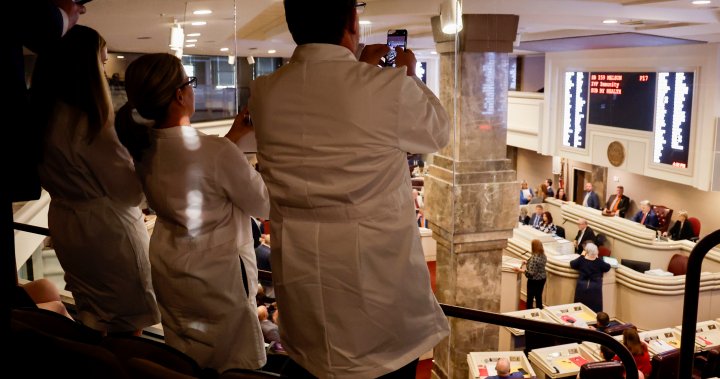
Alabama lawmakers approve bill to protect IVF providers from lawsuits
Global News
The bill was approved in a late-night session by lawmakers scrambling to address a wave of criticism after services were halted at some of the state's largest fertility clinics.
Facing pressure to get in vitro fertilization services restarted in the state, Alabama’s governor swiftly signed legislation into law Wednesday shielding doctors from potential legal liability raised by a court ruling that equated frozen embryos to children.
Republican Gov. Kay Ivey signed the bill after it was approved in a late-night session by lawmakers scrambling to address a wave of criticism after services were halted at some of the state’s largest fertility clinics. Doctors from at least one clinic said they would resume IVF services on Thursday.
“I am pleased to sign this important, short-term measure inlto law so that couples in Alabama hoping and praying to be parents can grow their families through IVF,” Ivey said.
Republicans in the GOP-dominated Alabama Legislature opted to back the immunity proposal as a solution to the clinics’ concerns. But they shied away from proposals that would address the legal status of embryos created in IVF labs, action that some said would be needed to permanently settle the issue.
The Alabama Supreme Court last month ruled that three couples whose frozen embryos were destroyed in an accident at a storage facility could pursue wrongful death lawsuits for their “extrauterine children.” The ruling, treating an embryo the same as a child or gestating fetus under the wrongful death statute, raised concerns about civil liabilities for clinics. Three major IVF providers paused services.
The new law, which took effect immediately, shields providers from prosecution and civil lawsuits “for the damage to or death of an embryo” during IVF services. Civil lawsuits could be pursued against manufacturers of IVF-related goods, such as the nutrient-rich solutions used to grow embryos, but damages would be capped to “the price paid for the impacted in vitro cycle.”
Patients and doctors had traveled to Montgomery, to urge lawmakers to find a solution. They described appointments that were abruptly canceled and how their paths to parenthood were suddenly put in doubt.
Doctors from Alabama Fertility, one of the clinics that paused IVF services, watched as the bill got final passage. They said it will allow them to resume embryo transfers “starting tomorrow.”












